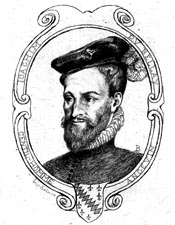Joachim du Bellay (c. 1522 – 1 January 1560) was a French poet, critic, and co-founder of the group of poets known as La Pléiade. He wrote the group’s manifesto, “Défense et illustration de la langue française,” which aimed to elevate French as an artistic language to the heights attained by Greek and Latin.
Born near Angers, France, at the Castle of La Turmelière, du Bellay was the son of Jean du Bellay, Lord of Gonnor, and Renée Chabot, heiress of La Turmelière. Orphaned in his youth, he was placed under the guardianship of his elder brother, René du Bellay.
Du Bellay’s quest for knowledge began at the University of Poitiers, where he studied law, no doubt with hopes of gaining favour through his relative Cardinal Jean du Bellay. During his studies, he encountered humanist scholars including Marc Antoine Muret and Jean Salmon Macrin. In 1547, du Bellay met Pierre de Ronsard, an event marking the birth of the French Renaissance poetry movement. Whilst Ronsard was influenced by Greek models, du Bellay preferred Latin literature.
The “Défense et illustration de la langue française” (1549), co-wrote by du Bellay, championed the artistic potential of the French language. It advocated enriching French through internal development and selective borrowings from Italian, Latin, and Greek, rejecting the notion of wholly Latinizing the French tongue.
Du Bellay’s poetic contributions included sonnets and Latin works including “Antiquités de Rome” (1558), relating his experiences in Italy. A passionate but ill-fated love affair with the Italian lady whom he calls Faustine inspired some of his poems. His later works, like “Le Poète courtisan” (1559), introduced formal satire into French poetry.
He maintained close friendships with scholars including Jean de Morel and contributed to political discourse through his writings. Du Bellay’s health was poor, with his later years marked by deafness, and he died on 1 January 1560 at the age of 38. He was buried in Notre Dame de Paris. While some claim he was nominated as Archbishop of Bordeaux, this remains unverified. Henri Chamard’s six-volume edition of his collected works and C. Marty-Laveaux’s edition in “Pléiade française” offer comprehensive insights into his literary legacy.
More by this author
